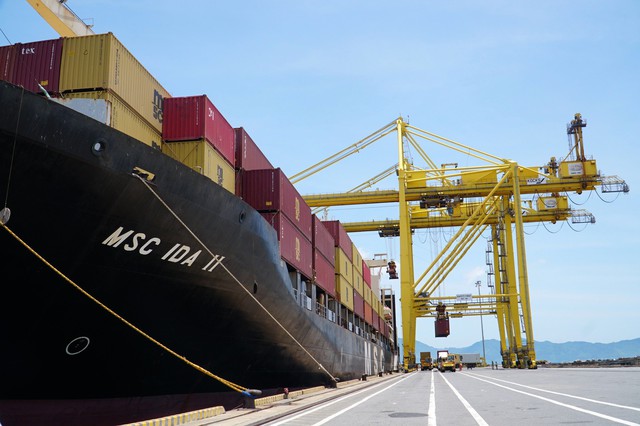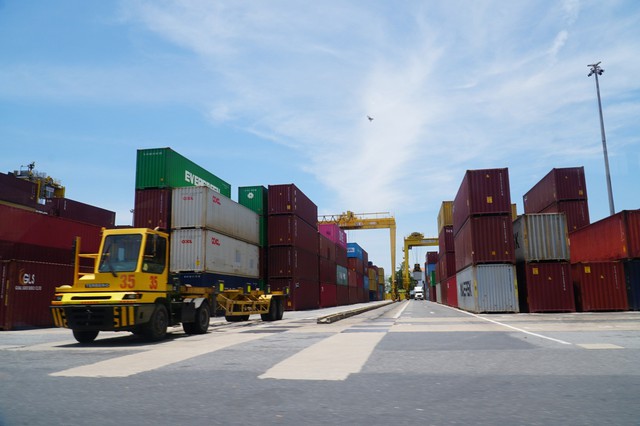
Ms. Le Thi Kim Phuong, Director of the Department of Industry and Trade of Da Nang City, stated that the city currently has around 14,000 people working in the logistics sector, a four-fold increase compared to 2011. This accounts for 2.7% of the national logistics workforce and approximately 40% of the logistics workforce in the key economic region of Central Vietnam. However, the available workforce only meets about 30-50% of the strong development demands of the logistics industry.
Addressing the shortage of labor, particularly high-quality labor, in fields like maritime, aviation, and warehousing, especially for specialized managerial positions in logistics with university or higher education degrees and professional training either domestically or abroad, is now a pressing necessity for both the city and the key economic region of Central Vietnam.
Currently, most businesses have to provide on-the-job training and skill development for their logistics workforce. "In Da Nang City and the Central Vietnam region, training in logistics-related fields at universities is mainly integrated into other majors such as foreign trade and international relations. Therefore, the availability of quality labor to serve the logistics sector remains limited," informed the Director of the Department of Industry and Trade of Da Nang City.
Mr. Tran Chi Dung, from the Sustainable Development and Digital Transformation Group at the ASEAN Federation of Forwarders Associations (AFFA), mentioned that the logistics workforce in Vietnam is lacking both experienced professionals and skilled workers.
"There are not many logistics management experts, and most of them rely on experience rather than a systematic understanding of the field. They haven't received comprehensive knowledge updates in management practices, so they can't be regarded as 'masters'; they're more like individuals who have been sustaining logistics operations without up-to-date expertise, which I'd call 'master shortage'. Furthermore, in the direct operational aspects, like warehouse management and transport management, many positions require vocational training or community college degrees. Unfortunately, the majority of workers in these roles receive minimal training. Hence, we're facing a 'shortage of skilled workers'," assessed Mr. Tran Chi Dung.

"Enhancing the Quality" of the Logistics Industry
According to Mr. Tran Chi Dung, the training of human resources for the logistics industry should place a stronger emphasis on quality and focus.
Addressing the issue of logistics workforce requires concentrating on three main aspects: Establishing professional standards for logistics to standardize training; prioritizing the training of instructors - the core force in training logistics personnel; creating practical internship environments for students that combine theory with real-world experience.
"In recent years, many universities have introduced logistics programs, but the lecturers still lack extensive experience. Most training programs are built upon one another, with those coming later referencing those that came before. Specifically, the program names are the same, and the teaching materials are also very similar. Alongside this, there is a common trait of lacking practicality. The theory might be correct, but there's a significant gap between theory and reality. Especially during the digital transformation phase, applications and business models have changed, but there aren't any books that can keep up," assessed Mr. Tran Chi Dung.
According to him, the best approach is to shorten the training duration and place students directly into work environments. After gaining practical experience, workers can then choose a suitable field and continue their education to obtain relevant certifications.
Assoc. Prof. Dr. Ho Thi Thu Hoa, Director of the Vietnam Logistics Research and Development Institute, suggests focusing on supporting educational institutions in forming a teaching team, particularly experts in logistics. Supporting the teaching staff in logistics at various schools allows teachers to enhance their professional and vocational expertise, especially knowledge and standards according to FIATA (International Federation of Freight Forwarders Associations). "With a solid team of instructors, we will have a workforce of high-quality individuals with strong skills to meet the demands of logistics development," shared Assoc. Prof. Dr. Ho Thi Thu Hoa.
Mr. Somsak Wisetruangrot, President of the AFFA Logistics Training Institute, suggested the need for supplementary programs that support mutual training of human resources in countries within the ASEAN region. "Currently, AFFA has a logistics training institute that can partially support the training of logistics personnel. Additionally, in Vietnam, universities and businesses can collaborate with the Vietnam Logistics Service Association (VLA) to provide training for students and the workforce," Mr. Somsak Wisetruangrot shared.
Cre: Goverment News




